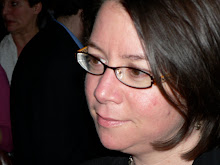I spent two hours with Jordan's class this afternoon. The first half-hour was taping a pocket into each of the 18 science notebooks, which, to me, is a pleasant thing to do while just observing what goes on in there. Then it's school picture day, so there was half an hour of lining up and waiting around during which I helped monitor things, combed kids' hair, and learned everyone's name. Then recess. In the last 45 minutes I helped with the day's science activity, which was seed planting. One table of four at a time came over to the planting station and:
1. filled plastic cups with damp potting soil
2. poked two holes in the soil with a designated poking pencil, on opposite sides of the cup, at the side so that you would see the seed as it grew
3. put a seed in each hole
4. covered up each seed with dirt
5. circled the seed's location on the outside of the cup with a grease pencil
6. taped a seed to the outside of the cup, as a label
7. stuck a sticker on the cup corresponding to that table's color
8. watered the seeds with 15 sprays from a sprayer bottle.
I don't actually like doing this sort of thing with kids -- it's so hectic, with all the simultaneousness and motor coordination and sharing and the potential for spills and so on. But it went fine -- first graders are pretty polite and coordinated -- and it was a fun way to get to know them all a little bit. I am musing on what science is, or what science is perceived as being by teachers and kids.... is it mainly the "bench work" (the hands-on procedures)? Because to me, the best part was the five-minute discussion they had beforehand, on the carpet, in which they said what they think seeds need to grow. They said all the basic things (dirt, water, air, light), and then they started on the more interesting stuff. One kid said "fertilizer," for example, and other kids wanted to talk about chicken poop and cow poop, which is in fertilizer. Ms. Wodrich responded to all that in a friendly way (gently steering the talk away from poop), but it didn't get written on the board, so ... do seeds need fertilizer, or not? What is fertilizer? She did say something about the soil we would use being "potting soil, which has some fertilizer in it." I don't know what potting soil contains and I'm not so interested in that, but I'm super interested in how kids think plants work. For example, I wonder if the kids are thinking about plant food. Living things have to get their energy from somewhere; animals get it by eating; do plants "eat"? (Aside from carnivorous plants, I mean.) And if so what do they eat? Now this is a marvelous, important question; this is a question of what makes a plant a plant. After all, I could eat dirt (or fertilizer) and get something out of it. But I can't eat sunshine.
Another thing I wonder about is whether kids might think you need fertilizer to "wake up" a seed into growing. I didn't hear them talking about that, I just wondered about it later. And what about poop - why does poop make good fertilizer? That would be a fascinating topic, if you ask me, though possibly uncontrollable among first graders.
Later, I asked Jordan why he thought the teacher had written "light" and "air" and "soil" and "water" on the board but not "fertilizer," and Jordan said: "Because it was already up there, Mommy. The dirt is the fertilizer. Or the fertilizer makes the dirt a little bit better, it gives it more nutrients, but pretty much the fertilizer is the dirt because in the forest the leaves fall down and decompose and they give their nutrients to the soil and that is the fertilizer and the dirt both." This is a terrific answer as far as I'm concerned. We also talked about what is "food" for a plant, and he said that both soil and sun are food, and maybe air too. I am curious what other kids think.

1 comment:
As someone totally uneducated in botany (and even general gardening), I have personally enjoyed fertilizing my plants with the free coffee grounds given out by coffee shops. There's part of me that is amused by giving coffee to non-human things, imagining that the plants feel perkier after getting their caffeine. Really, I know the plants don't use the caffeine - they just benefit from the added acidity of the coffee grounds. My choice in fertilizer is due mainly to its lack of cost - but perhaps also because I apparently enjoy personifying plants.
Post a Comment